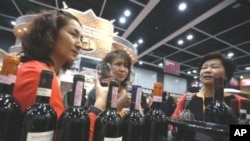Demand is growing for fine or rare wines in Hong Kong and China, as wealthy people stock up on the beverage for pleasure or as an investment. Prices are reaching record levels Hong Kong.
At an auction late last month in Hong Kong, three bottles of Chateau Lafite-Rothschild from 1869 sold for $230,000 each.
The world record price has the city's wine industry cheering about Hong Kong's prospects as Asia's wine trading hub. Since Hong Kong abolished its tax on wine in 2008, imports and exports have grown. Many of the re-exports from Hong Kong go to mainland China, where wealthy individuals are stocking up.
According to Crown Wine Cellars, a Hong Kong company that stores fine wines for clients, one in four bottles of fine wines globally are held by Hong Kong, Chinese or Taiwanese collectors.
Peter Lunzer runs Lunzer Wine Investments in London and helped pick the auctioned Chateau Lafite wines for their seller. Lunzer recently opened an office in Hong Kong to entice local and mainland Chinese enthusiasts to invest in a wine fund.
Since red wine gets better with age and because of its rarity, Lunzer says these liquid investments may offer a higher profit than stocks.
"When wine is made, there is only a certain amount of that wine in one year," he said. "Once it's been made, it is impossible to do anything than see that production go down in volume because people start drinking."
China's thirst for wine developed only recently. In the past, Chinese fermented beverages, hai jiu, or distilled beverages, bai jiu, were the preferred celebratory drinks. Until a few years ago, good quality imported wines were hard to find in Beijing and very expensive.
But Lunzer says growing affluence have changed people's tastes. Most wines consumed in China today are red.
"Wine doesn't really go very well with Chinese food. It can be quite a problem. Maybe it wasn't the most obvious choice but there has been so much Western influence in terms of other symbols of success and affluence … that wine was a very natural one to follow," he said.
That demand has also spurred the development of the fledgling domestic wine industry as well as a counterfeit trade - with cheap wine bottled to look like expensive imported labels.
Chinese enthusiasts are not only searching for French wines. China is the fastest growing market for Australian wines. Australian wineries sold about a third more bottled wines in the first nine months of this year from the same period last year.
U.S. wines are also enjoying a brisk business. Hong Kong imports of U.S. wines, mostly from California, more than doubled last year from 2008 to $40 million. Hong Kong has become the fourth largest market for American wines, a major jump from 15th place in 2007.
In September, mainland Chinese investors bought the Napa Valley winery Silenus Vintners. This month, CK Life Sciences, a company backed by Hong Kong's richest man Li Ka-shing, offered to buy a majority stake of Challenger Wine Trust, which has vineyards in Australia and New Zealand.
Another auction of rare French wines will take place in January in Hong Kong, and is expected to fetch a total of $1.6 million for 128 cases.
Growing Thirst for Fine Wines in China




